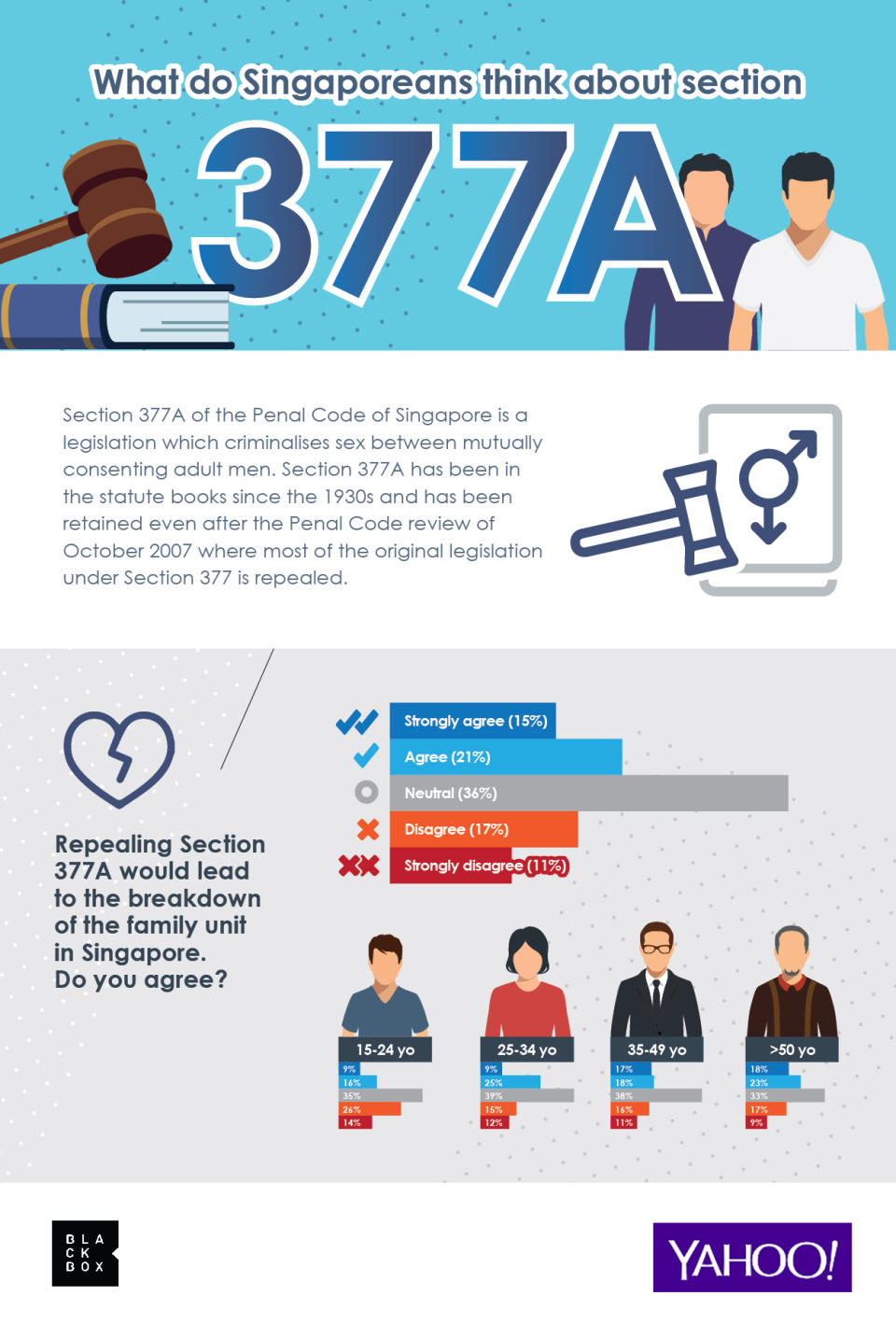Singapore residents split on whether 377A repeal would lead to breakdown of family unit: survey

This is the first of four stories based on the responses by Singapore residents to questions in a Blackbox Research survey related to Section 377A of the Penal Code.
Singapore residents are divided on whether a repeal of Section 377A of the Penal Code would lead to a breakdown of the family unit, according to a survey conducted by market research consultancy Blackbox Research.
Section 377A criminalises sex between men but authorities in Singapore have said it is rarely enforced.
One of the questions posed by a recent survey commissioned by Yahoo News Singapore was: “Repealing Section 377A would lead to the breakdown of the family unit in Singapore. Do you agree?”
Of the 1,000 respondents, 36 per cent strongly agreed or agreed with the statement while some 28 per cent strongly disagreed or disagreed with it. The remaining 36 per cent of respondents were neutral on the issue.
By age group, fewer respondents aged 15-24 years old agreed with the statement, compared with those from the older age groups. Only 25 per cent from the age group strongly agreed or agreed with the statement, followed by 35 per cent who were neutral and 40 per cent who strongly disagreed or disagreed with it.
Among those aged 50 years and above, 41 per cent agreed that the removal of the law, first introduced during the British colonial era, would be detrimental to the Singapore family unit. About 33 per cent of the respondents in the age group were neutral on the statement and 26 per cent strongly disagreed or disagreed with it.
The respondents in the Blackbox poll, which was conducted from 12-19 October this year, are Singaporeans and permanent residents.

The debate over Section 377A, introduced in Singapore in 1938, was reignited after the Supreme Court of India ruled on 6 September that consensual gay sex was not a crime in the country following a two-decade legal battle.
The landmark ruling stirred heated discussions between LGBT activists in Singapore, who argue for a repeal of the law, and those who are against such a move.
Veteran Singapore diplomat Tommy Koh waded into the debate when he encouraged Singapore’s LGBT community to bring a class action to challenge the constitutionality of Section 377A in a Facebook post.
Walter Woon and V K Rajah, both former Attorney-Generals (AG), have pointed out that Section 377A poses a constitutional problem given that the government had stated that the authorities will not proactively enforce the law. Woon said 377A sets a “dangerous precedent” whereby the political authorities are informing the public prosecutor – who is supposed to be independent – not to enforce some laws.
But current AG Lucien Wong said his office has discretion on whether to initiate proceedings for any offence under 377A.
The views among the leaders of the different faiths are somewhat divided on the issue, with most taking a firm stance in urging Singapore to keep the law.
The president of Buddhist Fellowship (Singapore) Lim Phang Hong, had signed the petition to repeal Section 377A and written on Facebook in support of such a move.
On the other hand, religious bodies such as the National Council of Churches, Singapore Islamic Scholars and Religious Teachers Association (Pergas) and the Roman Catholic Archdiocese of Singapore have strongly urged the authorities to retain the law in order to safeguard the traditional family unit.
Related stories:
Most Singapore residents agree religious views shouldn’t influence the law: survey
Repeal 377A organisers urge supporters to reach out to their MPs
K Shanmugam answers queries on Section 377A by church leaders at briefing



